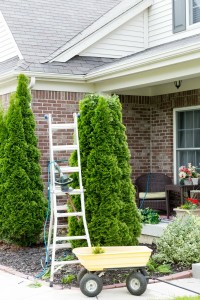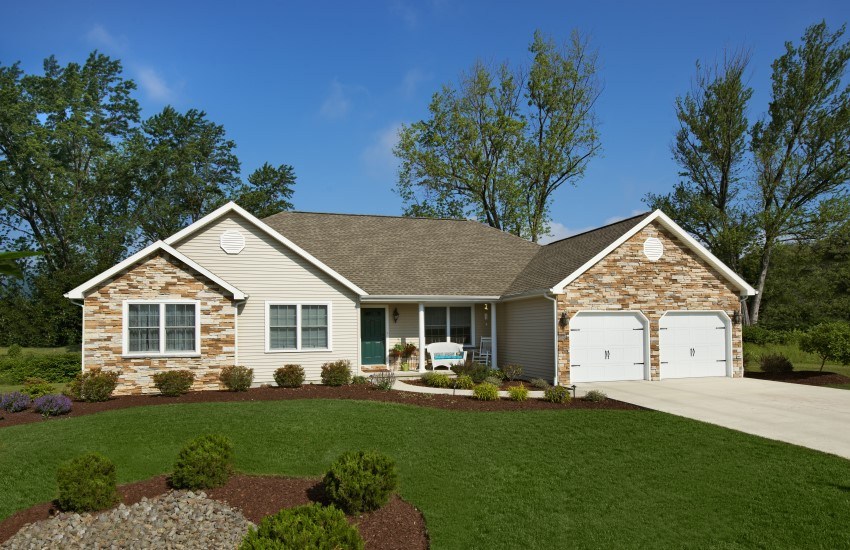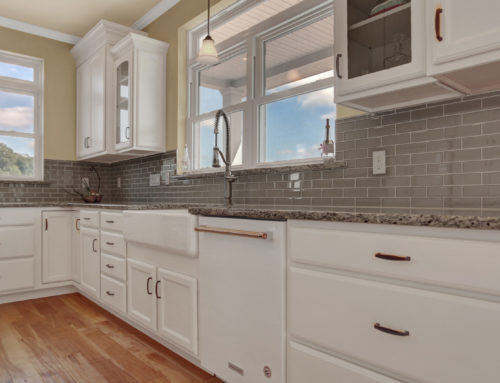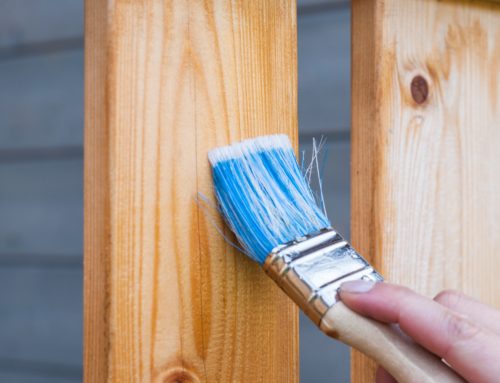By: Pat Curry who is a former senior editor at “Builder,” the official magazine of the National Association of Home Builders, and a frequent contributor to real estate and home-building publications.
Here are eight ways to help your home put its best face forward.
Homes with high curb appeal command higher prices and take less time to sell. We’re not talking about replacing vinyl siding with redwood siding; we’re talking about maintenance and beautifying tasks you’d like to live with anyway.
The way your house looks from the street — attractively landscaped and well-maintained — can add thousands to its value and cut the time it takes to sell. But which projects pump up curb appeal most? Some spit and polish goes a long way, and so does a dose of color.
Tip #1: Wash your house’s face
Before you scrape any paint or plant more azaleas, wash the dirt, mildew, and general grunge off the outside of your house. REALTORS® say washing a house can add $10,000 to $15,000 to the sale prices of some houses.
A bucket of soapy water and a long-handled, soft-bristled brush can remove the dust and dirt that have splashed onto your wood, vinyl, metal, stucco, brick, and fiber cement siding. Power washers (rental: $75 per day) can reveal the true color of your flagstone walkways.
Wash your windows inside and out, swipe cobwebs from eaves, and hose down downspouts. Don’t forget your garage door, which was once bright white. If you can’t spray off the dirt, scrub it off with a solution of 1/2 cup disodium phosphate—TSP, available at grocery stores, hardware stores, and home improvement centers—dissolved in 1 gallon of water.
You and a friend can make your house sparkle in a few weekends. A professional cleaning crew will cost hundreds–depending on the size of the house and number of windows–but will finish in a couple of days.

Tip #2: Freshen the paint job
The most commonly offered curb appeal advice from real estate pros and appraisers is to give the exterior of your home a good paint job. Buyers will instantly notice it, and appraisers will value it. Of course, painting is an expensive and time-consuming facelift. To paint a 3,000-square-foot home, figure on spending $375 to $600 on paint; $1,500 to $3,000 on labor.
Your best bet is to match the paint you already have: Scrape off a little and ask your local paint store to match it. Resist the urge to make a statement with color. An appraiser will mark down the value of a house that’s painted a wildly different color from its competition.
Tip #3: Regard the roof
The condition of your roof is one of the first things buyers notice and appraisers assess. Missing, curled, or faded shingles add nothing to the look or value of your house. If your neighbors have maintained or replaced their roofs, yours will look especially shabby.
You can pay for roof repairs now, or pay for them later in a lower appraisal; appraisers will mark down the value by the cost of the repair. According to Remodeling Magazine’s 2014 Cost vs. Value Report, the average cost of a new asphalt shingle roof is about $19,000.
Some tired roofs look a lot better after you remove 25 years of dirt, moss, lichens, and algae. Don’t try cleaning your roof yourself: call a professional with the right tools and technique to clean it without damaging it. A 2,000 sq. ft. roof will take a day and $400 to $600 to clean professionally.

Tip #4: Neaten the yard
A well-manicured lawn, fresh mulch, and pruned shrubs boost the curb appeal of any home.
Replace overgrown bushes with leafy plants and colorful annuals. Surround bushes and trees with dark or reddish-brown bark mulch, which gives a rich feel to the yard. Put a crisp edge on garden beds, pull weeds and invasive vines, and plant a few geraniums in pots.
Green up your grass with lawn food and water. Cover bare spots with seeds and sod, get rid of crab grass, and mow regularly.
Tip #5: Add a color splash
Even a little color attracts and pleases the eye of would-be buyers.
Plant a tulip border in the fall that will bloom in the spring. Dig a flowerbed by the mailbox and plant some pansies. Place a brightly colored bench or Adirondack chair on the front porch. Get a little daring, and paint the front door red or blue.
These colorful touches won’t add to the value of our house: appraisers don’t give you extra points for a blue bench. But beautiful colors enhance curb appeal and help your house to sell faster.
Tip #6: Glam your mailbox
An upscale mailbox, architectural house numbers, or address plaques can make your house stand out.
High-style die cast aluminum mailboxes range from $100 to $350. You can pick up a handsome, hand-painted mailbox for about $50. If you don’t buy new, at least give your old mailbox a facelift with paint and new house numbers.
These days, your local home improvement center or hardware stores has an impressive selection of decorative numbers. Architectural address plaques, which you tack to the house or plant in the yard, typically range from $80 to $200. Brass house numbers range from $3 to $11 each, depending on size and style.

Tip #7: Fence yourself in
A picket fence with a garden gate to frame the yard is an asset. Not only does it add visual punch to your property, appraisers will give extra value to a fence in good condition, although it has more impact in a family-oriented neighborhood than an upscale retirement community.
Expect to pay $2,000 to $3,500 for a professionally installed gated picket fence 3 feet high and 100 feet long.
If you already have a fence, make sure it’s clean and in good condition. Replace broken gates and tighten loose latches.
Tip #8: Maintenance is a must
Nothing looks worse from the curb — and sets off subconscious alarms — like hanging gutters, missing bricks from the front steps, or peeling paint. Not only can these deferred maintenance items damage your home, but they can decrease the value of your house by 10%.
Here are some maintenance chores that will dramatically help the look of your house:
- Refasten sagging gutters
- Repoint bricks that have lost their mortar
- Reseal cracked asphalt
- Straighten shutters
- Replace cracked windows
Visit HouseLogic.com for more articles like this. Reprinted from HouseLogic.com with permission of the NATIONAL ASSOCIATION OF REALTORS®.











